
After a long day of supporting those impacted by the Pulse nightclub shooting in June 2016, John Hunt, co-founder of Crisis Response Canines, and Gunther, his 3-year-old Rottweiler, traveled to a nearby Cross Memorial to pay their respects to those who lost their lives. That’s when they found a young man crying.
“Gunther and I approached him and we started to chat,” recalls Hunt. “He was kneeling in front of one of the crosses and began to pet and hug Gunther. He told about how he and his friend — who was hiding inside a bathroom in the nightclub — were texting, when suddenly the texts stopped. Turns out, the friend was one of the victims. Gunther, non-judgmental, sat alongside and allowed him to hold and hug him while he remembered a loved one.”
This is just one of many times the CRC dogs have been there to help heal. The loss of life in mass tragedies is only the tip of the brittle, unsettling landscape. What follows is a cascading mix of emotions for those left behind.
Enter Crisis Response Canines (Sicklerville, New Jersey) which serves up a dose of psychological first aid for survivors and victims’ families and friends. “We can’t change what happened,” says Hunt, of Gloucester Township, New Jersey, “but we can certainly prompt a few smiles and conversations from those who have cried their hearts out and not wanted to interact with anyone until now.”
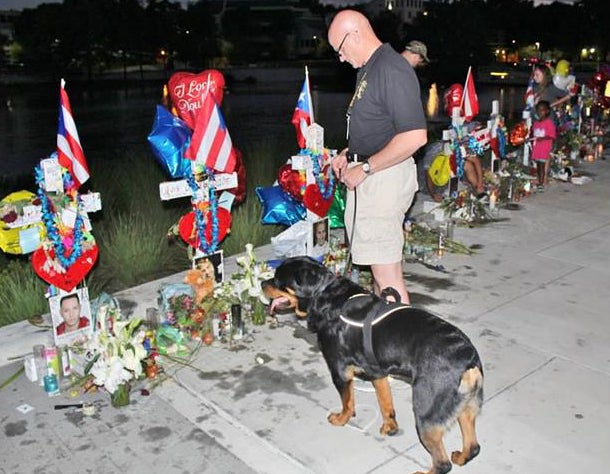
In acknowledgment of Gunther’s service, he has been named winner of the 2019 AKC Humane Fund Service Award For Canine Excellence (ACE) in the “Therapy Dog” category. Gunther and Hunt will be recognized at the AKC National Championship presented by Royal Canin in Orlando, Florida, in December.
What are Crisis Response Canines?
Hunt and Andrea Hering, CRC chief executive officer and president, along with 33 other teams in seven states (Pennsylvania, New Jersey, Maryland, Virginia, Colorado, New York and Florida) have been embracing feet on the ground for the stirring challenges facing them following mass shootings. These include Orlando, Florida (Pulse nightclub), Las Vegas (Route 91 Harvest music festival), Sutherland Springs, Texas (First Baptist Church); Parkland, Florida (Marjory Stoneman Douglas High School); and Pittsburgh (Tree of Life synagogue).
When a major tragedy occurs, Hunt emphasizes CRC “does not respond in ad-hoc fashion.” The organization has cultivated connections throughout the country that will initiate communication with groups and command centers near the incident. “Those liaisons coordinate events and before we deploy we have a schedule and agenda, which allows us to plan travel arrangements and how many teams are required,” he says.
At this point, the all-volunteer (there is no paid staff) CRC lists teams in seven states – Pennsylvania, New Jersey, Maryland, Virginia, Colorado, New York, and Florida.
When flying to major tragedies, all CRC dogs travel in the cabin, since they are considered working dogs. If the crisis is a drivable distance, teams will choose that option. “We assess the deployment to maximize efforts to serve the community in need,” explains Hering.
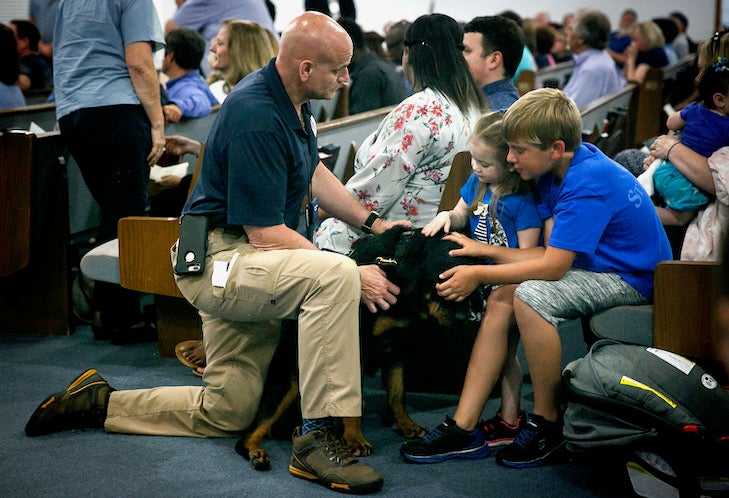
Certified, Four-Legged Ambassadors
The four-legged ambassadors are required to be certified with a national therapy-dog organization. Deployment dogs must possess a CRC Crisis Working Dog and Law Enforcement Defensive Systems Crisis Working Dog certifications along with AKC Canine Good Citizen, AKC Canine Good Citizen Advanced and AKC Canine Good Citizen Urban titles. All must have therapy-dog certification, as well. Add to that many compete in AKC sports such as Rally, Obedience, Tracking, and Nose Work.
Deployment handlers must achieve incident command designation along with the completion of CRC psychological and mental-first aid requirements. “This stringent protocol differentiates our teams from others,” Hunt adds.
Each request for CRC help is assessed, then the number of teams deployed is determined. Usually, four to six team members are brought in, allowing the organization to split up and maximize its time visiting with the community.
Finances are a major challenge for the 501 (c) (3) nonprofit whose budget is tied to the number of deployments annually. Chief expenses are insurance, shirts/vests for teams, minimal administration and deployment costs.
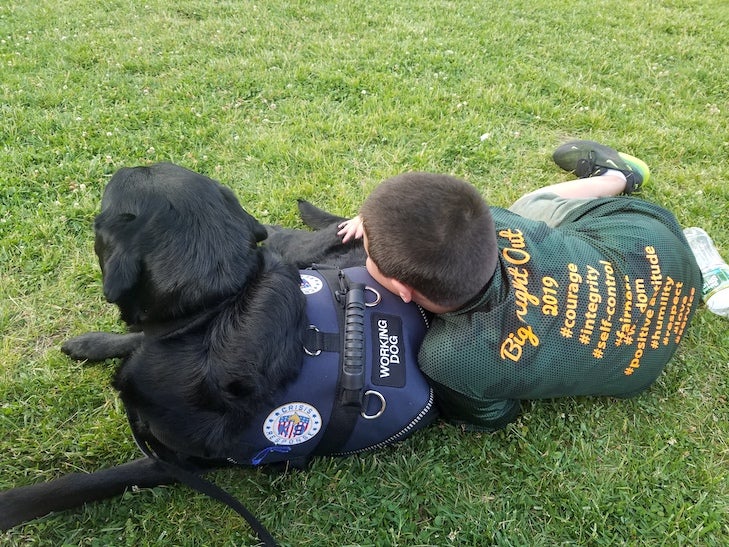
The Magic of a Dog’s Touch
For Hunt, many memories will be embedded for a lifetime.
For instance, after the First Baptist Church shooting in Nov. 5, 2017, in which 26 were killed and another 20 wounded, he says,
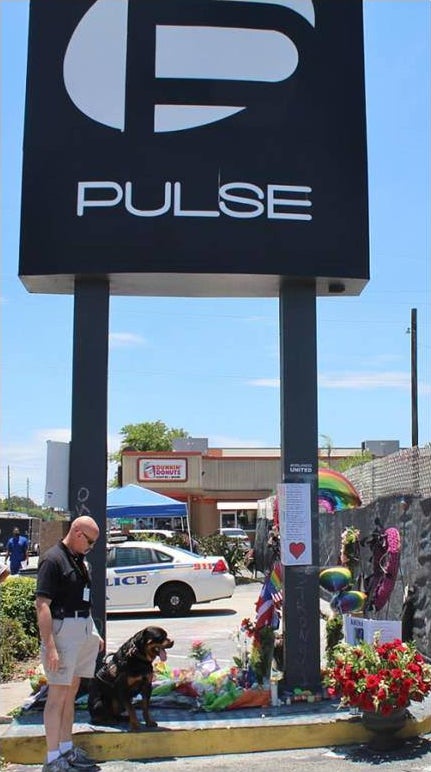 “The most profound interaction of all occurred when Gunther and I were with the pastor (Frank Pomeroy). He revealed how his 14-year-old daughter (Annabelle, who was one of the 26 victims) had always wanted to have a role with therapy dogs. We spoke about her desire and what she believed was so important about these dogs and their interactions with those affected by this kind of horrific event. As he petted Gunther, he was strong and so supportive of all those who came up to him and offer sympathy. A true rock.”
“The most profound interaction of all occurred when Gunther and I were with the pastor (Frank Pomeroy). He revealed how his 14-year-old daughter (Annabelle, who was one of the 26 victims) had always wanted to have a role with therapy dogs. We spoke about her desire and what she believed was so important about these dogs and their interactions with those affected by this kind of horrific event. As he petted Gunther, he was strong and so supportive of all those who came up to him and offer sympathy. A true rock.”
Following the Pulse nightclub carnage that took 49 lives and left 53 wounded, the CRC teams focused on the first responders. “We were asked to visit stations to interact with firemen and paramedics,” Hunt recalls. “One paramedic was reluctant to engage until he observed ‘the Rottweiler.’
He then opened up about his desire to go into harm’s way to render first aid to those who were shot. As he spoke, several of us noticed how he petted Gunther and kept him close. That’s the role of our special canines. Don’t ask questions, just be there. Allow folks to feel them and provide a moment of decompression and comfort.”
Healing Across the Country
Thanks to one of CRC’s Pennsylvania members, the organization was requested to visit several hospitals tasked to treating victims of the Tree of Life mass shooting Oct. 27, 2018 in Pittsburgh, where 11 were killed and seven injured.
Many police who entered the synagogue in the midst of the shooting gathered at a hospital later to check in on the victims. “One after another would hold or pet Gunther while recounting their heart-wrenching and challenging experiences,” says Hunt. “Again, strength through comfort. Emotional support! The need to communicate is key in this recovery process, and our dogs are the best listeners in the world. It is incredibly rewarding to just watch them gently connect.”
While at the Cross Memorial in Las Vegas honoring 58 victims of the Route 91 Harvest music festival, Hunt and Gunther encountered a mother whose son survived the shootings, yet she was there to honor those who did not. It resembled an emotional catharsis. “She was highly affected, clearly understanding that her son could be one of the names on those crosses. She held and petted Gunther throughout our visit.”

Opening Up
Hunt cites another stirring incident from a hospital visit in Atlantic City, New Jersey, where the other CRC teams had been asked to visit behavioral health patients. A nurse asked if he would consider talking with a military veteran who refused to speak to the doctor, nurses or counselors in his unit.
“I went in and began chatting about my son who is a captain in the U.S. Marine Corps. As I was speaking Gunther sat directly in front of the young man. After a short time, he began to stroke Gunther’s head and converse openly about himself and his military experiences. Soon, the doctor entered the conversation and began asking questions. The veteran continued speaking and answered the doctor’s questions. Gunther and I remained for about a half hour while the patient continued conversing with both the doctor and myself.
“Eventually, I told him I was going to visit others and that I would return another time. He was grateful and talkative as we departed.”
The doctor followed Hunt and Gunther out of the unit and admitted he thought it was ridiculous when the nurse asked Hunt to visit with the veteran. “He said he watched in awe as the patient began to interact with Gunther and chat openly. He added that Gunther made him a believer.”
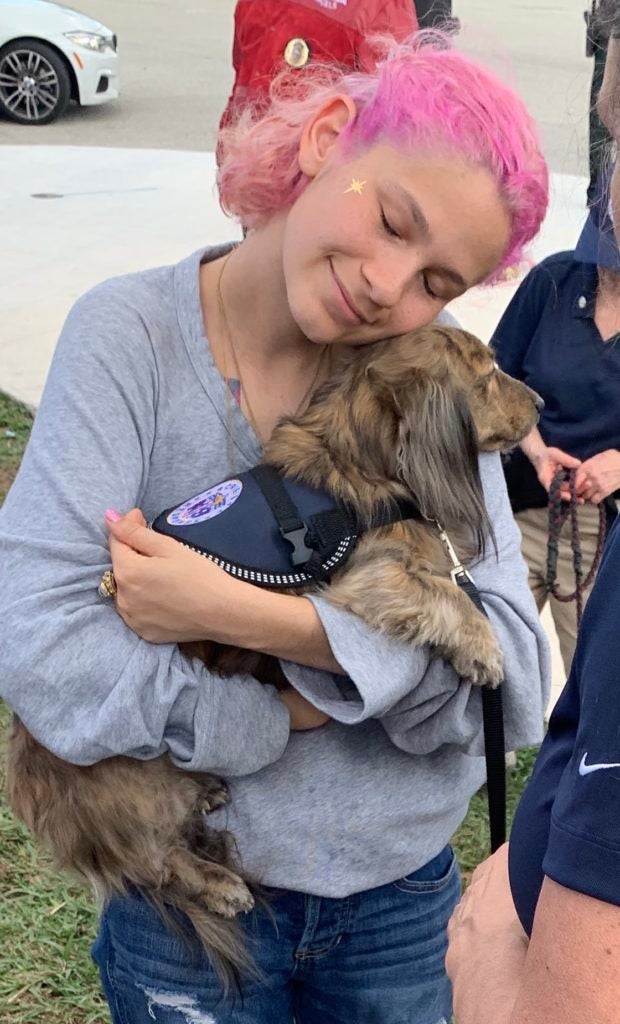
Changing Lives One Dog at a Time
For Hering, the memories are equally poignant.
“After a tragedy, there is normally a cross memorial set up, one for each victim. Our first stop is to pay our respects there. In Texas (First Baptist Church in Sutherland Springs), we pulled up and it was right off the main road. Normally this is where the media and crowds gather. I decided to walk around to the back side of the church with Rusty (her 9-year-old Golden Retriever mix) and down the street. I came upon a woman just staring at the front of the church, which had a fence around it with a black tarp.
“There were volunteers all about from other organizations but she was not speaking to anyone, just staring. She saw Rusty from a distance and asked to pet him. As she began petting him, she told me there were so many people around all they want to do is talk, but that she didn’t trust anyone. I just stood and listened as she talked to Rusty, not me. Then she stood up, looked at me and said ‘I heard the gun shots and saw the EMs running in to help people.’ And said, because of Rusty, she trusted me and started opening up.”
The Sunday following the tragedy, Hering and Rusty attended church services in a huge nearby tent. At one point, each patron went up front to receive a special blessing. En route back to her seat, the woman spotted Rusty, prompting a huge smile and exclamation, “Rusty!” She bent down, Hering says, gave him a big hug and he proceeded to lick tears streaming down her cheeks. “Before we left we made sure to say goodbye to her. There was a special moment when she bent over, kissing Rusty and bidding him goodbye. I know if I ever saw her again, she would not know me but would certainly remember my dog.”
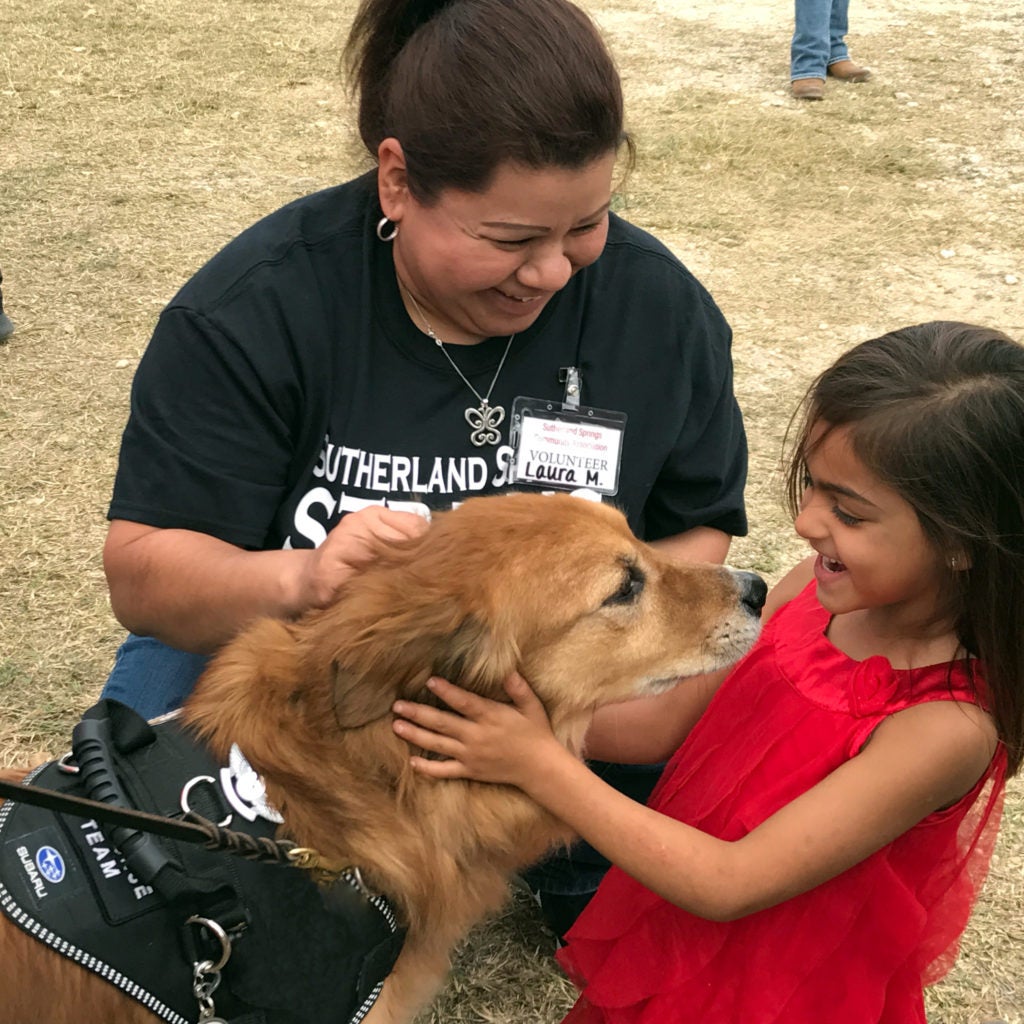
Unsung Heroes
One of Hering’s most impactful Rusty memories dealt with the aftermath of a May 2018 Paramus (New Jersey) School District bus accident in Mount Olive, New Jersey, that claimed the lives of a student and a beloved teacher and left 43 others injured. In the days following the crash, three young girls refused to re-enter the teacher’s classroom after getting to the threshold and finding themselves overcome with emotion.
“After talking with a counselor,” Hering says, “we decided to see if we could get Rusty to encourage them to enter the room. We asked the girls if they wanted to take Rusty for a walk to show their friends. They accepted the challenge and walked down the hallways with him. We made stops at other classrooms so he could meet their friends and then asked, ‘Why don’t you take him into your classroom and show him around.’ There was a small hesitation, then Rusty pulled them in one at a time. Next, we asked the girls to show him their favorite things in the room.
“Within a few minutes, we were able to get them to start talking of their favorite memories about the teacher. It was amazing how Rusty broke down this monumental barrier with the three and allowed them to move forward.”
Both Hunt and Hering credit CRC’s success to the dedication and passion of its volunteers and their families. “They are the unsung heroes here,” Hunt emphasizes.
In August, Gunther and Hunt responded to the shootings in El Paso and Dayton. The AKC proudly honored Gunther as a 2019 ACE Award winner.

